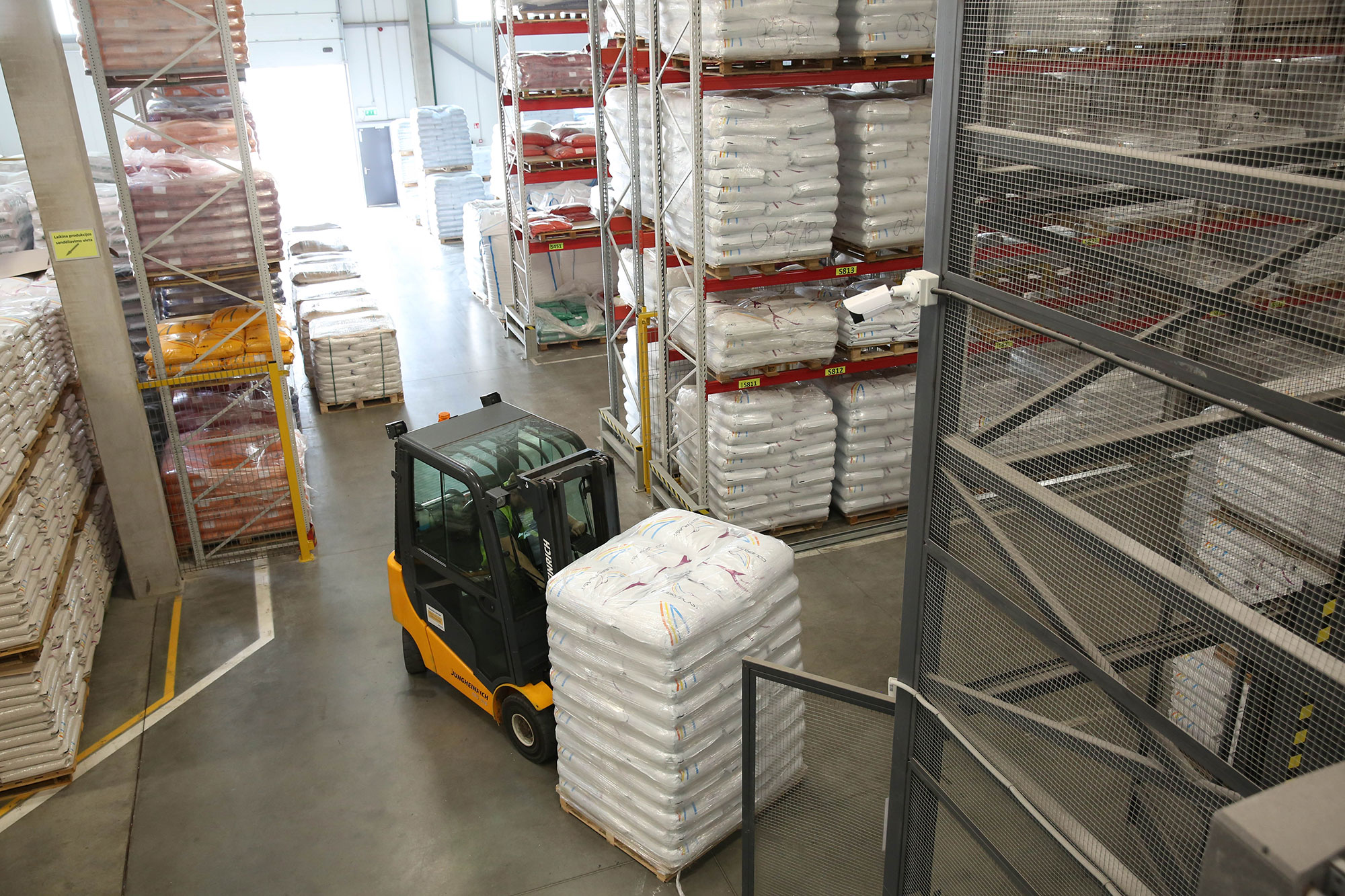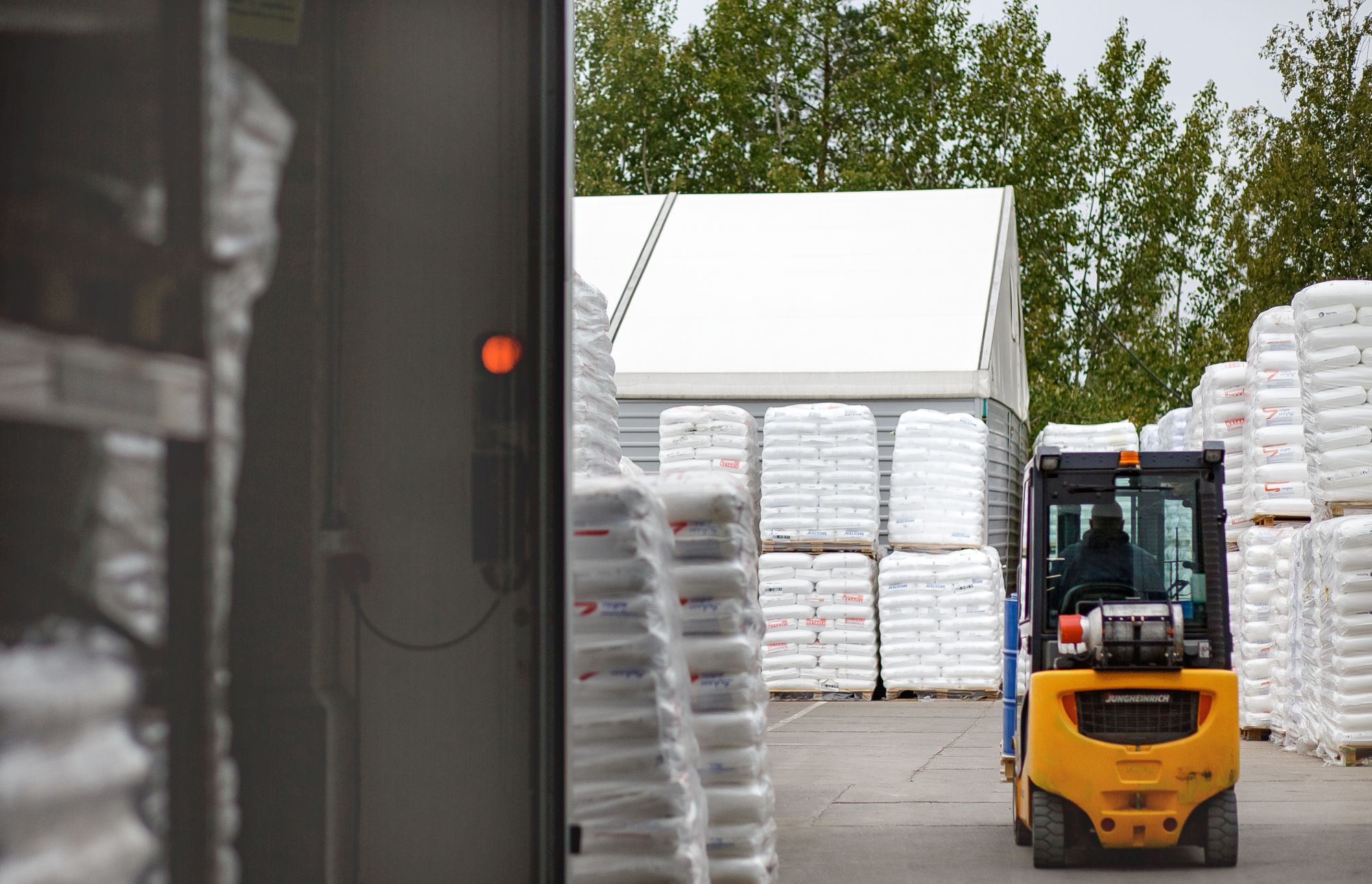RAW MATERIAL SUPPLY
Vilkritis supplies base polymers and engineering plastics. For more than 20 years, the company has been among the largest and most innovative plastic manufacturers in the world. Customers who purchase raw materials are given technical advice and recommendations on product selection. Vilkritis also conducts laboratory tests and offers services on planning, credit, and delivery in on-demand packaging.

LDPE: low-density polyethylene
This type of polyethylene is particularly popular and is used in the manufacture of flexible single-layer or multi-layer packaging as well as for laminating, foaming and moulding.
MDPE: medium-density polyethylene
For flexible single-layer and multi-layer packaging; for film extrusion.
HDPE: high-density polyethylene
A solid and strong raw material with a wide range of applications: for the manufacture of flexible single-layer and multi-layer packaging, pipes, bottles, canisters, and geomembranes.
LLDPE: linear low-density polyethylene
A highly popular raw material combined with other polyethylene, which can be used to make both flexible and rigid packaging as well as tubes and various containers.
mPE: metallocene polyethylene
The use of metallocenes allows for the creation of shrink films of extremely high quality, and multilayer films with exceptional mechanical and optical properties.

Polypropylenes form a highly popular and multidisciplinary group of plastics. Their applications range from pipes, temperature-resistant and high-intensity packaging (designed to be used in microwaves, dishwashers or to be filled with hot liquids) to high-temperature disinfection medical supplies.
PPH: homo-propylene
Used for the manufacture of consumer goods, food boxes, boxes, and sheets.
PPC: Polypropylene Impact Copolymer
A widely-used group of raw materials, which is resistant to the impact of negative temperatures and is suitable for casting.
PPR: random Copolymer Polypropylene
The clearest version of polypropylene, especially popular in the packaging industry.
PET: polyethylene terephthalate
Widely used for disposable packaging and bottles and is easy to recycle.
PVC: polyvinyl chloride
An indispensable material in the construction industry for the manufacture of durable pipes or flexible cable insulation as well as other plastic products.
GPPS: general purpose polystyrene
Crystal-like, widely used for the manufacture of household items and packaging (including foam packaging).
HIPS: high impact polystyrene
Owing to its physical and mechanical properties, this is chosen for the manufacture of TV sets, refrigerators, and other household appliances.
EPS: expandable polystyrene
Used for heating up homes and manufacturing heat-saving food packaging.
ENGINEERING PLASTICS
PC: Polycarbonate
Transparent engineering plastic characterised by high impact strength and excellent optical properties. It is widely used in the automotive industry, construction, manufacture of home appliances, coffee makers, sound recording media, sunglasses, and medical goods.
ABS: Acrylonitrile butadiene styrene
A raw material of natural and ivory colour that can be pigmented. Owing to its strength and impact resistance, it is recommended for use in the manufacture of electrical equipment (enclosures, keyboards, and household items).
PMMA: Polymethyl methacrylate
Transparent thermoplastic that is very similar to polycarbonate. Owing to its natural transparency and impact resistance, it is used in the manufacture of LCD screens, windows, exhibit enclosures, and some medical devices.
SAN: Styrene acrylonitrile
Hard, rigid and transparent material with good resistance to high temperatures. This makes it ideal for use in the manufacture of transparent cosmetic containers, kitchen bowls, and refrigerator fasteners.
ASA: Acrylonitrile styrene acrylate
A possible alternative to ABS, which features increased weather resistance and is widely used in the automotive industry and for 3D printing.
TPE: Thermoplastic elastomers
A flexible material suitable for moulding, manufacture of sports goods, yoga mats, pen and screwdriver handles, erasers, various cell phone accessories, beach accessories, and so on.
TPU: Thermoplastic polyurethane
An intermediate material between rubber and plastic, an ageing-resistant natural substitute for PVC. It is widely used in footwear, safety shoes, handles, wires, and ropes.
TPO: Thermoplastic olefin
A blend of PP, PE, BCPP, and rubber. It is usually reinforced and is considered an ideal material for the needs of the automotive industry (bumpers, handles, etc.).
TPV: Thermoplastic vulcanizates
An environmentally friendly and recyclable material that is very easy to process. It has all the advantages of natural rubber and is used in the automotive industry and in the manufacture of electric wires.
SBR: Styrene butadiene rubber
A synthetic rubber highly resistant to abrasion, which means it provides the same opportunities for use as natural rubber but at a lower cost. It is a suitable material for the manufacture of gaskets, mats, and shock absorbers, and for the removal of abrasion between metal surfaces.
PA: Polyamide
Commonly known as nylon and may be marked with the type reference: 6, 66, 12, and 4. The type refers to the different properties of nylon. In general, however, PA is valued for its strength, high impact resistance, and easy processing. It can be painted and reinforced with talc, fibreglass, and other materials, and is used in the automotive and engineering industries.
SEBS: Styrene ethylene butylene styrene
One of the most extensively used thermoplastic rubbers for moulding and extrusion. It is transparent and can be painted as ordered by the customer. It is used in the automotive industry to make wire insulation, interior fittings, and handles.
POM: Polyoxymethylene
Mainly used for injection moulding, where stiffness and precision are required. The natural raw material is white and opaque but it can be painted. POM is used for the manufacture of furniture handles, zippers for clothes, parts for toys, and parts for electronic devices and installations.
PVC: Polyvinyl chloride
A cheap plastic used for the manufacture of pipes and profiles like doors and windows. It is also used for bottles, non-food packaging, and so on. According to need, it can be either rigid or flexible.